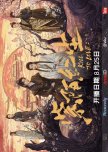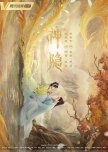

Political revenge dramas where the male lead returns after many years away to avenge a wrongdoing that left them the sole survivor of their family. The leads are smart and pragmatic, and both these dramas are stunning in their scope of acting and cinematography.


Love stories where the characters are torn apart by circumstances, and the behaviours and actions of one leads to tragedy for the one they love most.
Although Good Bye, My Princess has many more episodes to develop and evolve its plot compared to Kill to Love, there remain instances in Kill to Love that deliver the same heartache and pain. You can find yourself both wishing the best for the pairing while also hoping one of them finds better for themselves than how the other treats them at times, and both stories are written well. They'll likely both manage to leave you feeling empty afterwards, as well as remaining in your thoughts long after watching.
Although Good Bye, My Princess has many more episodes to develop and evolve its plot compared to Kill to Love, there remain instances in Kill to Love that deliver the same heartache and pain. You can find yourself both wishing the best for the pairing while also hoping one of them finds better for themselves than how the other treats them at times, and both stories are written well. They'll likely both manage to leave you feeling empty afterwards, as well as remaining in your thoughts long after watching.


Kill to Love and The Untamed share the same director.
While The Untamed isn't directly BL due to the restrictions imposed within China, it does the best it can to show the relationship between Lan Wangji and Wei Wuxian is a romantic one. Kill to Love on the otherhand aired in Singapore and managed to weave around the restrictions, allowing it to air even as a true BL show without any censorship.
Both The Untamed and Kill to Love ae based on danmei webnovels.
While The Untamed isn't directly BL due to the restrictions imposed within China, it does the best it can to show the relationship between Lan Wangji and Wei Wuxian is a romantic one. Kill to Love on the otherhand aired in Singapore and managed to weave around the restrictions, allowing it to air even as a true BL show without any censorship.
Both The Untamed and Kill to Love ae based on danmei webnovels.


Two revenge stories that both span over many years. There are many moments in Legend of Zang Hai that rang reminiscent to the classic Nirvana in Fire to me - from the change in facial identity for the main character to the slow paced plans to upset a system that ripped the families apart from those characters. If you're a fan of revenge stories or one of these shows, then you should absolutely do yourselves a favour and check out the other!


Moonlight Mystique and The Last Immortal are both stories set in the same universe. Although there is no connections between the characters this time, both stories follow similar genres and themes. If you're a fan of one, it's definitely worth giving a shot at the other!


Ancient Love Poetry and Moonlight Mystique are part of the same universe of stories, with Anicent Love Poetry being set thousands of years prior to Moonlight Mystique. Bai Shuo and Fan Yue are the reincarnations of Yuemi and Tian Qi from Anicent Love Poetry, although neither Bai Shuo nor Fan Yue are aware and it isn't mentioned in the show.
You can watch both as standalone easily, but Ancient Love Poetry shows a more tragic side to the couples love story, whereas Moonlight Mystique grants them a second chance that's more happy and hopeful. Both shows are incredible, and worth checking out if you enjoyed either.
You can watch both as standalone easily, but Ancient Love Poetry shows a more tragic side to the couples love story, whereas Moonlight Mystique grants them a second chance that's more happy and hopeful. Both shows are incredible, and worth checking out if you enjoyed either.


Godzilla (1954) is the movie which started it all, and Godzilla Minus One is a fantastic modern take on the kaiju's story.
Both films hold similarities with one another, acting as commentary for the events prior to the Second World War. Godzilla (1954) is a heavy critique on nuclear warfare and the atomic bombings of Hiroshima and Nakasagi, showing a very real picture of a post-war Japan trying to pull itself back up whilst still suffering the after-effects. Minus One also follows this message, showing a more in depth side of the daily life and struggle of the recovering country. Both Godzilla (1954) and Minus One show how the introduction of an overpowering, never before seen threat in the form of Godzilla proves yet another struggle for the civilians of Japan to rise up against, forcing them to band together to find a way to destroy him and save their country.
If you enjoyed the new Minus One movie and would like to see another, more serious take on the kaiju rather than the 'monster of the week' battle royale style later movies followed, then do yourselves a favour and check out the original. It still holds up strong even over seventy years later!
Both films hold similarities with one another, acting as commentary for the events prior to the Second World War. Godzilla (1954) is a heavy critique on nuclear warfare and the atomic bombings of Hiroshima and Nakasagi, showing a very real picture of a post-war Japan trying to pull itself back up whilst still suffering the after-effects. Minus One also follows this message, showing a more in depth side of the daily life and struggle of the recovering country. Both Godzilla (1954) and Minus One show how the introduction of an overpowering, never before seen threat in the form of Godzilla proves yet another struggle for the civilians of Japan to rise up against, forcing them to band together to find a way to destroy him and save their country.
If you enjoyed the new Minus One movie and would like to see another, more serious take on the kaiju rather than the 'monster of the week' battle royale style later movies followed, then do yourselves a favour and check out the original. It still holds up strong even over seventy years later!


The Last Immortal is Ancient Love Poetry's sequel, following the story of Shang Gu and Bai Jue's son, Gu Jin. Both shows are some of the best of the xianxia genre, with engaging plots, great casts of characters and beautiful visuals and soundtracks. If you enjoyed either story, I highly recommend the other - both are worth your time!


Both Godzilla (1954) and Shin Godzilla (2016) have much more realistic, dramatic storytelling elements to them than other entries into this franchise. They both carry commentary on the after-effects of radiation - Godzilla following ten years after the Second World War and being a metaphor for the H Bomb, and Shin Godzilla a result of the dumping of Nuclear waste in Tokyo Bay.
Both act as two of the strongest entries into the franchise to date, and contain many topics of discussion which will leave the viewer thinking long after they've watched these films.
Both act as two of the strongest entries into the franchise to date, and contain many topics of discussion which will leave the viewer thinking long after they've watched these films.
























